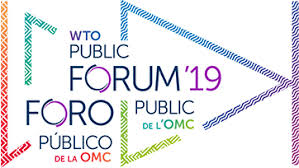AI, IP, and the future of digital trade
9 Oct 2019 02:00h
Event report
[Read more session reports from WTO Public Forum 2019]
The session was moderated by Ms Alicia Daly (Associate Policy Officer on Artificial Intelligence and Data, Office of the Director General, World Intellectual Property Organization (WIPO)), who started by explaining artificial intelligence (AI) and its impact on global trade. She talked about the availability of AI and the development of algorithms.
In addition, Daly talked about intellectual property (IP) protection and the protection of software, hardware, data, and AI applications. She mentioned the boom of AI in the scientific world, and particularly at universities. According to her, many companies are using AI in e-commerce, which is changing the way of doing business. She noted that IP is helping in the use of new instruments brought forth by technology and innovation. She invited the panellists to discuss the global investment environment, cross-border collaborations, and legal and regulatory environments.
Ms Monique Goeschl (General Manager, International Federation of Film Producers Associations (FIAPF)) talked about the economic benefits derived from IP rights, including greater knowledge-based, technological, and creative outputs. According to her, in 2013, there were 7.5 million jobs; including 2.7 million in Asia Pacific and 1 million in Africa. There was a 44.8% contribution to GDP and a 38.9% contribution to direct and indirect employment between 2014 and 2016.
In addition, Goeschl said that IP constitutes indispensable assets in modern economies. She also touched upon the online impediments to successful IP-based sectors and the challenges in securing the appropriate online environment for IP-based sectors to thrive. In conclusion, she said that we need greater interconnectivity, mutual recognition, co-ordination, reciprocity, innovation, partnership, and respect.
Ms Joni Laura (Senior Director and Legal Counsel, Qualcomm) started by talking about 5G, and how it is going to drive technological change in connectivity. She added that it brings a higher network speed. She talked about wireless communication in the context of 5G and noted multiple input and multiple output (MIMO) technology. She finally noted automation in vehicles enabled by 5G, private networks, and the Internet of things (IoT).
Mr Daniel Marti (Head of Global Government Affairs, RELX Group) started by explaining the business-to-business (B2B) model utilised by the RELX Group. He talked about IP and innovations in the development of AI. He noted machine-learning algorithms in data collection.
In addition, Marti said that the use of IP must respect copyright rules and frameworks. He also talked about the role of openness in IP and in innovation. He mentioned the need for investment in AI and for data collection. He highlighted the importance of integrity when developing and utilising AI. According to him, we must be aware of the content of the data we are collecting and use it ethically in decision-making.
Mr Walter Chia (Acting Director, International Engagement, Intellectual Property Office of Singapore (IPOS)) started by explaining IP and AI in the Singaporean context. He said that the economy of the future will be driven by intangible assets. According to him, 80% of the market value of S&P 500 companies is due to their intangible assets (such as IP and data). He talked about a variety of digital initiatives that IPOS is involved in, as well as trends in global patent filing related to AI. He noted that there are hurdles to IP protection for AI.
Chia questioned whether patent protection is the best option. He emphasised potential patent eligibility issues for core AI as it is often related to algorithms. Moreover, he talked about supporting the economic development and transformation of Singapore. He noted ‘Singapore’s digital transformation and innovation journey’. He also highlighted Singapore’s Model AI Governance Framework, which is built around key principles such as explainability, fairness, responsibility, accountability and transparency, and human-centricity and well-being.
Related event

